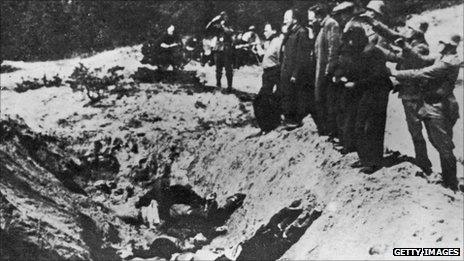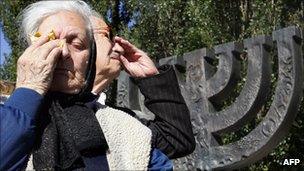Babi Yar massacre: Poet Yevgeny Yevtushenko recollects
- Published

Jews were rounded up and shot before being pushed into the ravine
It is 70 years since what is believed to be the biggest single massacre of the Holocaust. On 29 and 30 September 1941, the Nazis took almost 34,000 Jews to the edge of the Babi Yar ravine in Ukraine's capital Kiev and shot them all.
The horror of what happened was highlighted 20 years later when Russian poet Yevgeny Yevtushenko wrote a poem entitled Babi Yar. He spoke to BBC World Service.
It is 70 years since the massacre of these innocent victims, and it is 50 years since I wrote the poem Babi Yar.
I wrote it in August 1961 in the city of Kiev, and - surprisingly - it was published.
I met the writer Anatoly Kuznetsov - he was an eyewitness to what happened in Babi Yar.
He told me the story, and I asked him to accompany me to the site.
I knew there was no monument at Babi Yar, but I was expecting to see some sign of respect.
But what I saw was absolutely terrible - there were lots of trucks and they were unloading stinking garbage on the tens of thousands of people who were killed. I did not expect that.
As soon as I got back to my hotel, I sat down and I began to write - it took probably four or five hours, no more.
Most of my poetry is based on either love and tenderness or on shame.
It was desperation - shame came to dictate this poem.
I felt guilty myself, a kind of personal sense of guilt on my young fragile shoulders.
I do not call Babi Yar a political poem. It is above politics - human suffering is more. You cannot compare that with politics.
When I read the poem to my wife, she said: "It is so terrible what happened there, that it is better not to write about it."
She was right in a way - it is very difficult to find words which are expressive enough. It was too much for words. Words are too weak.
I understood her, but I said: 'We have to write about such things. We cannot allow future generations to forget."
When I recited Babi Yar for the first time in public, there was an avalanche of silence. I was absolutely shocked - paralysed.
And afterwards a very, very little old woman with grey hair and a cane - her cane had been knocking against the stage - she came to me in the dead silence.
She said just one sentence, "I was in Babi Yar." She was one of the survivors who crawled from under the mountain of dead bodies.
The poem was a criticism of anti-Semitism worldwide, including Soviet anti-Semitism, and was against all kinds of racism.

It was decades before memorials were put in place at Babi Yar
I was not afraid because I had already been expelled from the Literary Institute - I had been expelled from all kinds of organisations.
And I believed there was a future of change for Russia - that was also important.
The poem was one of the changes; it was one first hole in the iron curtain.
The composer Dmitri Shostakovich called me, and he was very polite.
He said: "You gave words to my thoughts. I have a dream to write music to your poem. Would you be so kind as to give me your permission."
I do not remember what I mumbled - I was overwhelmed, on the verge of euphoria.
The music of Shostakovich made this poem 10 times stronger.
Shostakovich's 13th Symphony forced Ukrainian party bureaucracy to build a memorial.
He was the moral architect of this memorial.